 Petzlover
Petzlover Icelandic Sheepdog is originated from Iceland but Kanni is originated from India. Icelandic Sheepdog may grow 22 cm / 8 inches shorter than Kanni. Icelandic Sheepdog may weigh 8 kg / 17 pounds lesser than Kanni. Both Icelandic Sheepdog and Kanni has almost same life span. Both Icelandic Sheepdog and Kanni has same litter size. Icelandic Sheepdog requires Moderate Maintenance. But Kanni requires Low Maintenance
Icelandic Sheepdog is originated from Iceland but Kanni is originated from India. Icelandic Sheepdog may grow 22 cm / 8 inches shorter than Kanni. Icelandic Sheepdog may weigh 8 kg / 17 pounds lesser than Kanni. Both Icelandic Sheepdog and Kanni has almost same life span. Both Icelandic Sheepdog and Kanni has same litter size. Icelandic Sheepdog requires Moderate Maintenance. But Kanni requires Low Maintenance
 There are quite a few different dog breeds that fall under the name of Spitz-type dogs, and in fact they have a number of similar characteristics, one of which is that they have some wolf-like features. They typically have the thick coat with undercoat and the erect, pointed ears and slanted eyes.
There are quite a few different dog breeds that fall under the name of Spitz-type dogs, and in fact they have a number of similar characteristics, one of which is that they have some wolf-like features. They typically have the thick coat with undercoat and the erect, pointed ears and slanted eyes.
There is definitely a strong link between the Spitz type dogs and wild wolves. The tail too is feathery and can curl over the back of the dog.
The Icelandic Sheepdog, a native dog to Iceland, is a Spitz type dog which originates from the dogs brought to Iceland by the Vikings. The dogs have always been used to herd sheep, and they resemble dogs found in graves in Sweden and Denmark.
The dog at one time was facing extinction in the late 20th century, but in 1969, the Icelandic Dog Breeder Association was established to restore and preserve the breed. The Icelandic Sheepdog gained AKC recognition in June 2010.
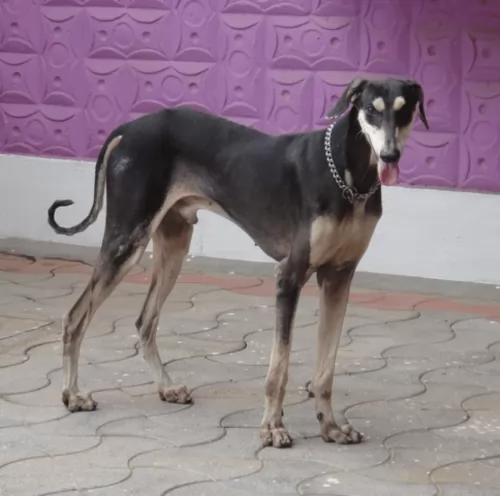 The Kanni dog is a rare South Indian Sighthound. It is also known as the Maiden's Beastmaster and this is because it is known to be protector and defender of its owner's property.
The Kanni dog is a rare South Indian Sighthound. It is also known as the Maiden's Beastmaster and this is because it is known to be protector and defender of its owner's property.
During ancient times, the dog was used for hunting but today it is essentially kept as a pet and it is registered with the Kennel Club of India.
 The Icelandic Sheepdog is a smallish to medium sized dog standing at 40 to 45cm in height and he can weigh anything between 9 and 14kg.
The Icelandic Sheepdog is a smallish to medium sized dog standing at 40 to 45cm in height and he can weigh anything between 9 and 14kg.
His double coat can be short or long, straight or wavy and in a mix of colors such as grey and white or tan and white, black, tan and white, cream or chocolate. Even though they come in a number of predominant colors, these colors are always accompanied by white markings.
He has a longish muzzle, much like the wolf, giving him an alert, foxy appearance. He has a muscular, rectangular body with strong, straight legs with dewclaws on both the front and hind legs.
Your social, energetic dog will require socialization and training which does him the world of good, turning him into a well-adjusted, obedient dog.
He is an intelligent dog, and training him won't be difficult as he is eager to please. These are social dogs which love being part of the family and they don't like being left outside day after day with little human intervention. He is a lively, confident breed, gentle and not at all aggressive.
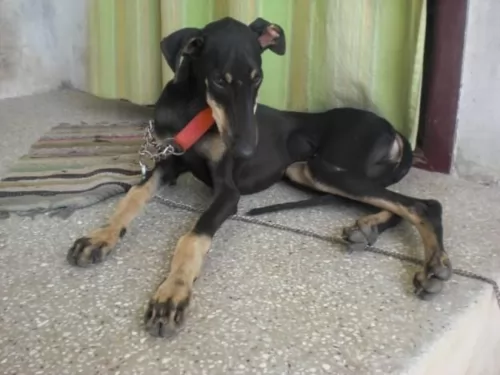 These dogs are tall, slim and deep chested, coming in two-color combinations, but it is the black and tan variety that is the true Kanni. There is also a cream variety. There are other color variations and each color has a unique name connected to it. The coat of the Kanni is short and smooth.
These dogs are tall, slim and deep chested, coming in two-color combinations, but it is the black and tan variety that is the true Kanni. There is also a cream variety. There are other color variations and each color has a unique name connected to it. The coat of the Kanni is short and smooth.
They are medium sized dogs standing at 62 to 67cm at the withers and weighing in the region of 18 – 22kg. When you first look at these dogs you might think of them as being similar to a Greyhound in looks. This is also because of their lean, muscular looks.
The eyes are a golden color, the nose black and the ears are a medium size and floppy with the long tail being semi-curved.
The Kanni has always been a hunting dog so he is used to being sharp, strong-willed, independent and alert as well as having some aggressive tendencies. It is also quite a reserved dog but he shows love and loyalty to his owner. He is independent and easy to train. It is a good thing to have him trained and socialized so that he is obedient to the simple commands you give him.
 The Icelandic Sheepdog is such a good all-round family pet. He is alert, intelligent, social, playful, loyal, loving and brave.
The Icelandic Sheepdog is such a good all-round family pet. He is alert, intelligent, social, playful, loyal, loving and brave.
He is friendly too, getting on well with children and any pets you have in the home. He is essentially a working dog, so you shouldn’t think of owning him as a pet if your lifestyle is centered around the TV and the couch for the best part of the day.
This is an energetic dog who wants lots of action during the day. He is a dog that badly wants to be part of the family and in exchange for looking after him well, he’ll promise to be an exceptional pet.
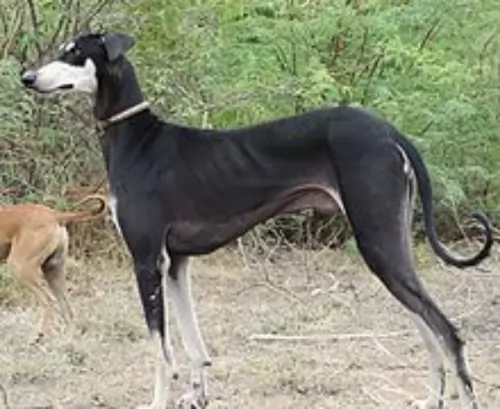 The Kanni looks much like your regular Doberman Pinscher but he has long tail and floppy ears. He is slim and agile but also powerful being able to have bursts of speed. It is why he requires a large place to run and play in, being better suited to a home with a large garden or farm.
The Kanni looks much like your regular Doberman Pinscher but he has long tail and floppy ears. He is slim and agile but also powerful being able to have bursts of speed. It is why he requires a large place to run and play in, being better suited to a home with a large garden or farm.
He is a playful, quiet dog but he has quite a bark on him and is known to be a good watchdog because of this. He is a protective dog too, devoted and loyal and making a splendid family pet.
 Your pet will reach 12 to 14 years of age with good care and is regarded as a generally healthy dog breed. However, they can be prone to a few health conditions, and these include hip dysplasia and diabetes.
Your pet will reach 12 to 14 years of age with good care and is regarded as a generally healthy dog breed. However, they can be prone to a few health conditions, and these include hip dysplasia and diabetes.
Mercifully for your pet, diabetes is considered a manageable disorder. When your pet doesn’t produce insulin or can’t utilize it normally, his blood sugar levels rise, resulting in hyperglycemia.
If left untreated, your pet can land up with a host of complicated health problems. Diabetes can be classified as either Type 1 or Type II, with the more common form in dogs being Type 1.
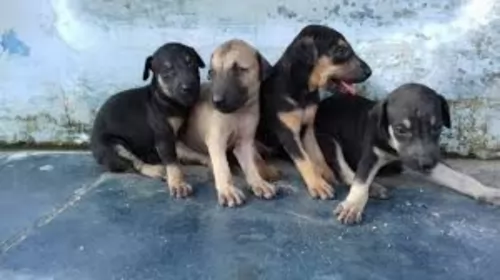 Not much is known about inherited health problems in this breed, and he can live up to a ripe old age of 16. It seems a pretty healthy dog, but still it helps to be aware of some of the more common dog illnesses that your pet can succumb to.
Not much is known about inherited health problems in this breed, and he can live up to a ripe old age of 16. It seems a pretty healthy dog, but still it helps to be aware of some of the more common dog illnesses that your pet can succumb to.
For first time dog owners it can be difficult knowing what health problems our beloved pets could suffer from. Every dog breed has certain diseases to which they are more prone to, but these are some common issues that most of our 4-legged friends will face -
This is a common dog health problem in India with the Kanni. There are so many things that disagree with their digestion. Most dogs may not want to eat their next meal, but when he is lethargic, he is hot and is vomiting, it is time to get your pet to the vet. This is because diarrhea causes rapid dehydration in dogs. To avoid diarrhea, steer clear of certain foods such as milk and dairy products as well as old, spoiled fatty foods. With diarrhea your dog must always have access to fresh, cool water.
This is a common dog disease, and ear infections can be painful and frustrating for your pet. He’ll scratch at his ear, shake his head and the inside of the ear may be red with a discharge. Check his ears for redness and try to keep them free from wax build up and dust.
Cleaning the ear is quite simple, and if you’re not sure how, the vet can do it quickly and effectively. Usually some dog ear cleaning solution on some cotton wool can do the trick. Ear infections are common in dogs like the Kanni with floppy ears.
It is essential to control fleas on your dog from word go. Fleas thrive in warm temperature and humidity and your pet will scratch, bite and lick at the spot. When you brush your pet, look through his fur for fleas and tell you vet about it if you discover ticks and fleas. A topical ointment could nip the problem in the bud. You may want to consider a flea collar for your pet.
Tapeworms, hookworms and roundworms for instance are commonly found in dogs, and even for healthy dogs, deworming tablets should be given from time to time. If your dog has worms, you’ll notice lethargy, loss of appetite, diarrhea and vomiting. It may be time to get your pet to the vet.
 Feed your energetic Icelandic Sheepdog a diet which is appropriate for his age and activity level. Don't just feed him the best commercially manufactured dog food, but give him some cooked chicken, brown rice and vegetables mixed into his kibble as a tasty treat. Also, dogs are carnivores, so include some raw meat into his diet from time to time. Clean, cool water should always be available.
Feed your energetic Icelandic Sheepdog a diet which is appropriate for his age and activity level. Don't just feed him the best commercially manufactured dog food, but give him some cooked chicken, brown rice and vegetables mixed into his kibble as a tasty treat. Also, dogs are carnivores, so include some raw meat into his diet from time to time. Clean, cool water should always be available.
The Icelandic Sheepdog has a thick double coat, with the outer coat being longer and the hair being shiny and glossy. These dogs shed quite a bit with seasonal shedding too so twice-weekly brushing will be necessary to keep the fur free of loose hair. His nails should also be checked regularly and his teeth should be brushed a couple of times a week too.
Icelandic Sheepdogs are athletic, active dogs that require a lot of exercise to keep them in good physical shape.
He loves all kinds of games and outdoor activities, one of which will be going with you for a walk every day. He makes a wonderful companion for those people going on long hikes.
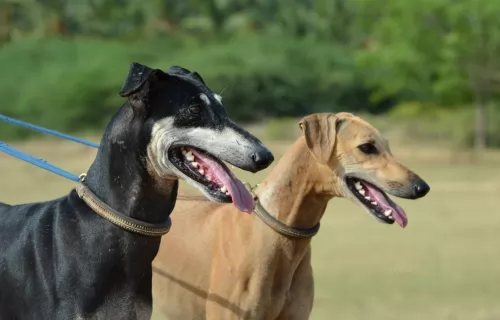 The Kanni is a low maintenance dog with his short coat. You can give him a good brush twice a week, check that his nails don't grow too long and also check his ears inside and out. Ticks and fleas are rife in hot weather and you want to give your dog a thorough check for these. You should also be checking your dog's teeth and brushing them 2 or 3 times a week. Dental problems can cause havoc with your dog's health.
The Kanni is a low maintenance dog with his short coat. You can give him a good brush twice a week, check that his nails don't grow too long and also check his ears inside and out. Ticks and fleas are rife in hot weather and you want to give your dog a thorough check for these. You should also be checking your dog's teeth and brushing them 2 or 3 times a week. Dental problems can cause havoc with your dog's health.
As a hunting breed, the Kanni is used to running so his needs for a good amount of exercise are quite high. While they do make good family pets, they hanker after wide open spaces and being busy. If you own one of these dogs, make sure that you exercise him often because otherwise he becomes frustrated and unhappy.
This dog has always been used to village life where he is free to roam wide open spaces. He is much more suited to country life than to city life, and as a pet, you will need to ensure that he receives a good amount of exercise.
Take him for walks, and if he's been socialized and trained, take him to the park and allow him off his leash to run.
The dog has always been fed traditional food such as porridge and milk but we know better now that dogs need protein too as well as a diet rich in vitamins and minerals to ensure his health.
You can feed him a top quality commercially manufactured dog food and add in some cooked chicken, rice and vegetables from time to time. It is expensive, but if you can, try and add in some raw meat occasionally as well. Your Kanni dog must always have access to fresh, clean water.